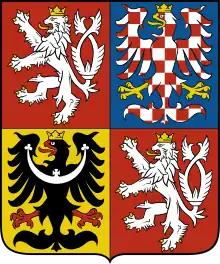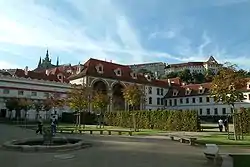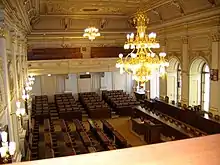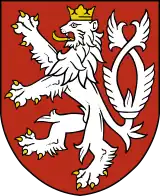Parliament of the Czech Republic
The Parliament of the Czech Republic (Czech: Parlament České republiky) or just Parliament (Czech: Parlament) is the legislative body of the Czech Republic, seated in Malá Strana, Prague.
Parliament of the Czech Republic Parlament České republiky | |
|---|---|
 | |
| Type | |
| Type | |
| Houses | |
| History | |
| Founded | 1 January 1993 |
| Preceded by | • Czech National Council • Federal Assembly |
| Leadership | |
| Structure | |
| Seats | 281 81 Senators 200 Deputies |
Senate political groups | Supporting government (73)
Opposition (9) |
Chamber of Deputies political groups | Government (108)
Opposition (92) |
| Elections | |
| Two-round system | |
| Proportional representation | |
Last Senate election | 23-24 September and 30 September-1 October 2022 |
Last Chamber of Deputies election | 8–9 October 2021 |
| Meeting place | |
 | |
| Wallenstein Palace, meeting place of the Senate | |
 | |
| Thun Palace, meeting place of the Chamber of Deputies | |
| Website | |
| Senate Chamber of Deputies | |
 |
|---|
|
|
It consists of two chambers, both elected in direct elections:
- the Upper House: Senate
- the Lower House: Chamber of Deputies
Art. 15 of the Constitution stipulates its name as the "Parliament".[1] The Parliament exercises competences usual in parliamentary systems: it holds and passes bills, has the right to modify the Constitution, ratifies international agreements; if necessary, it declares war, approves presence of foreign military forces in the Czech Republic or a dispatch of Czech military forces abroad.
History

The tradition of modern parliamentarianism in the Bohemian lands dates back to times of the Austrian Empire (and then Cisleithanian part of Austria-Hungary), where the Imperial Council (Reichsrat, Říšská rada) was created in 1861.
After proclamation of Czechoslovakia in 1918 its National Assembly (Národní shromáždění) undertook legislative duties both of the Imperial Council and State Diets (Bohemian, Moravian, Silesian).[2] In 1938–39 and between 1948–89 there existed a parliament within non-democratic regimes (right-wing authoritarian or Communist regime, respectively). As a consequence of federalization of Czechoslovakia (1968), national councils of Czech and Slovak parts of the country were created.
The Chamber of Deputies keeps continuity with the Czech National Council (Česká národní rada), while the Senate was established in 1996 (with reference to the First Czechoslovak Republic one).
External links
- psp.cz (official site)
Notes
- Tomáš Goláň was elected as non-partisan, nominated by SEN 21, shortly after election he defected to and became member of ODS.
- Jaroslav Chalupský is non-partisan, nominated by Svobodní.
- Zdeněk Hraba was elected as non-partisan, nominated by STAN, he changed club during his term.
- Tomáš Töpfer, Jan Pirk, Hana Kordová Marvanová, Marek Slabý and Jiří Růžička are non-partisans, nominated by coalition of ODS, TOP 09 and KDU-ČSL and possibly other local parties.
- Jiří Dušek is non-partisan, nominated by coalition of ODS, ČSSD and local parties.
-
- ODS (21)[lower-alpha 1]
- TOP 09 (4)
- Svobodní (1)[lower-alpha 2]
- ProMOST (1)
- non-partisans (9)[lower-alpha 3][lower-alpha 4] [lower-alpha 5]
- Hana Žáková, Miroslav Balatka, Miroslav Plevný, Jan Sobotka, Pavel Karník, Helena Pešatová and Karel Zitterbart are non-partisans, nominated by STAN.
- David Smoljak is a member of STAN, nominated by coalition of STAN, Pirates and TOP 09.
- Jiří Vosecký is member of SLK nominated by STAN and SLK.
- Zdeněk Linhart is non-partisan, nominated by STAN and SLK.
- Mikuláš Bek is non-partisan, nominated by coalition of Greens, ODS, TOP 09 and STAN; Jiří Drahoš is non-partisan, nominated by coalition of KDU-ČSL, Greens, STAN and TOP 09.
-
- STAN (11)[lower-alpha 7][lower-alpha 8]
- SLK (3) [lower-alpha 9][lower-alpha 10]
- Ostravak (1)
- MHS (1)
- non-partisans (2)[lower-alpha 11]
- Miluše Horská, Josef Klement and Lumír Kantor are non-partisans, nominated by KDU-ČSL.
- Petr Fiala is a member of SproK nominated by coalition of SproK and KDU-ČSL.
- Jaromíra Vítková, Ivana Váňová and Eva Rajchmanová are non-partisans, nominated by coalition of KDU-ČSL, ODS and TOP 09.
-
- KDU-ČSL (8)[lower-alpha 13]
- SproK (1) [lower-alpha 14]
- non-partisans (3) [lower-alpha 15]
- Přemysl Rabas and Martin Krsek are non-partisans, nominated by SEN21.
- Adéla Šípová is non-partisan, nominated by Pirates.
- Jan Holásek is non-partisan, nominated by coalition of HDK, TOP 09, Greens, LES and SEN 21.
- Pavel Fischer is independently elected non-partisan.
-
- SEN 21 (2) [lower-alpha 17]
- Pirates (2) [lower-alpha 18]
- HDK (1)[lower-alpha 19]
- Independent (1)[lower-alpha 20]
- Ladislav Václavec and Miroslav Adámek are non-partisans, nominated by ANO.
- Zdeněk Matušek was elected as non-partisan, nominated by ANO and ČSSD.
-
- ANO (4)[lower-alpha 22]
- ČSSD (1)
- non-partisan (1) [lower-alpha 23]
References
- "The Constitution of the Czech Republic". Prague Castle. 2015. Retrieved 2017-05-25.
- Balík, S.-Hloušek, V.-Holzer, J.-Šedo, J.: Politický systém českých zemí 1848-1989. Brno 2006, p. 81.
